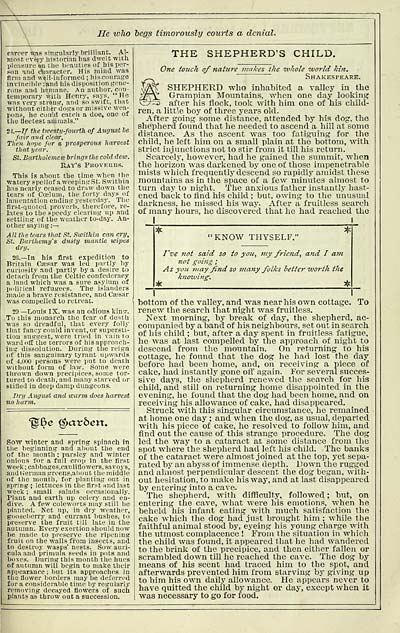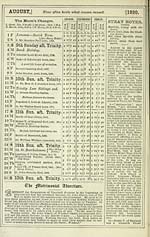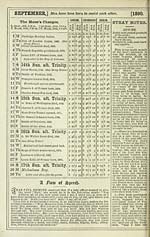Download files
Complete book:
Individual page:
Thumbnail gallery: Grid view | List view

He ivho begs timorously courts a denial.
cnreer -^as singularly brilliant. Al-
most every historian has dwelt with
pleasure on the beauties of his per-
son and character. His mind was
firm and well-informed ; his courage
invincible; and his disposition gene-
rous and humane. An author, con-
temporary -with Henry, says, "He
was very stronsr, and so swift, that
without either dogs or missive wea-
pons, he could catch a doe, one of
the fleetest animals."
24.— If the twenty-fourth of August be
fair and clear,
Then hope for a prosperous harvest
that year.
St. Bartholemew brings the cold dew.
Ray's Proverbs.
This is about the time when the
watery spellof a weeping St. Swithin
h:is nearly ceased to draw down the
tears of Cceluin, the forty days of
lamentation ending yesterday. The
first-quoted proverb, therefore, re-
lates to the speedy clearing up and
settling of the weather to-day. An-
other saying:—
All the tears that St. Swiihin can cry,
St. Barthemy's dusty mantle wipes
dry.
26.— In his first expedition to
Britain Ciesar was led partly by
curiosity and partly by a desire to
detach from the Celtic confederacy
a land which was a sure asylum of
political refugees. The islanders
made a brave resistance, and Cajsar
was compelled to retreat.
29 —Louis IX. was an odious kins - .
To this monarch the fear of de.'ith
was so dreadful, that every folly
that fancy could invent, or supersti-
tion suggest, were tried in vain to
ward off the terrors of his approach-
ing dissolution. During the reign
of this sanguinary tyrant upwards
of 4,000 persons were put to death
without form of law. Some were
thrown down precipices, some tor-
tured to death, and many starved or
stifled in deep damp dungeons.
Dry August and warm does harvest
no harm.
THE SHEPHERD'S CHILD.
^^e Qaxben.
Sow winter and spring spinach in
the beginning and about the end
of the month ; parsley and winter
onions for a full crop in the first
week ; cabbages, cauliflowers, savoys,
and German greens, about the middle
of the month, for planting out in
spring ; lettuces in the first and last
week ; small salads occasionally.
Plant and earth up celery and en-
dive. A few coleworts may still be
planted. Net up, in dry weather,
gooseberry and currant bushes, to
preserve the fruit till late in the
autumn. Every exertion should now
be made to preserve the ripening
fruit- on the walls from insects, and
to destroy wasps' nests. Sow auri-
cula and primula seeds in pots and
boxes. During this month the hues
of autumn will begin to make their
appearance ; but its approaches in
the flower borders may be deferred
for a considerable time by regularly
removing decayed flowers of such
plants as throw out a succession.
One touch of nature makes the whole world kin.
Shakespeare.
SHEPHERD who inhabited a valley in the
cM\±- Grampian Mountains, when one day looking
vi7^D after his flock, took with him one of his child-
ren, a little boy of three years old.
After going some distance, attended by his dog, the
shepherd found that he needed to ascend a hill at some
distance. As the ascent was too fatiguing for the
child, he left him on a small plain at the bottom, with
strict injunctions not to stir from it till his return.
Scarcely, however, had he gained the summit, when
the horizon was darkened by one of those impenetrable
mists which frequently descend so rapidly amidst these
mountains as in the space of a few minutes almost to
turn day to night. The anxious father instantly hast-
ened back to find his child ; but, owing to the unusual
darkness, he missed his way. After a fruitless search
of many hours, he discovered that he had reached the
I I
*
KNOW THYSELF."
I've not said so to you, ?uy friend, and I am
not goi?i° ;
As you ^i i ay find so many folks better worth the
knowing.
bottom of the valley, and was near his own cottage. To
renew the search that night was fruitless.
Next morning, by break of day, the shepherd, ac-
companied by a band of his neighbours, set out in search
of his child ; but, after a day spent in fruitless fatigue,
he was at last compelled by the approach of night to
descend from the mountain. On returning to his
cottage, he found that the dog he had lost the day
before had been home, and, on receiving a piece of
cake, had instantly gone off again. For several succes-
sive days, the shepherd renewed the search for his
child, and still on returning home disappointed in the
evening, he found that the dog had been home, and on
receiving his allowance of cake, had disappeared.
Struck with this singular circumstance, he remained
at home one day ; and when the dog, as usual, departed
with his piece of cake, he resolved to follow him, and
find out the cause of this strange procedure. The dog
led the way to a cataract at some distance from the
spot where the shepherd had left his child. The banks
of the cataract were almost joined at the top, yet sepa-
rated by an abyss of immense depth. Down the rugged
and almost perpendicular descent the dog began, with-
out hesitation, to make his way, and at last disappeared
by entering into a cave.
The shepherd, with difficulty, followed ; but, on
entering the cave, what were his emotions, when he
beheld his infant eating with much satisfaction the
cake which the dog had just brought him ; while the
faithful animal stood by, eyeing his young charge with
the utmost complacence ! From the situation in which
the child was found, it appeared that he had wandered
to the brink of the precipice, and then either fallen or
scrambled down till he reached the cave. The dog by
means of his scent had traced him to the spot, and
afterwards prevented him from starving by giving up
to him his own daily allowance. He appears never to
have quitted the child by night or day, except when it
was necessary to go for food.
cnreer -^as singularly brilliant. Al-
most every historian has dwelt with
pleasure on the beauties of his per-
son and character. His mind was
firm and well-informed ; his courage
invincible; and his disposition gene-
rous and humane. An author, con-
temporary -with Henry, says, "He
was very stronsr, and so swift, that
without either dogs or missive wea-
pons, he could catch a doe, one of
the fleetest animals."
24.— If the twenty-fourth of August be
fair and clear,
Then hope for a prosperous harvest
that year.
St. Bartholemew brings the cold dew.
Ray's Proverbs.
This is about the time when the
watery spellof a weeping St. Swithin
h:is nearly ceased to draw down the
tears of Cceluin, the forty days of
lamentation ending yesterday. The
first-quoted proverb, therefore, re-
lates to the speedy clearing up and
settling of the weather to-day. An-
other saying:—
All the tears that St. Swiihin can cry,
St. Barthemy's dusty mantle wipes
dry.
26.— In his first expedition to
Britain Ciesar was led partly by
curiosity and partly by a desire to
detach from the Celtic confederacy
a land which was a sure asylum of
political refugees. The islanders
made a brave resistance, and Cajsar
was compelled to retreat.
29 —Louis IX. was an odious kins - .
To this monarch the fear of de.'ith
was so dreadful, that every folly
that fancy could invent, or supersti-
tion suggest, were tried in vain to
ward off the terrors of his approach-
ing dissolution. During the reign
of this sanguinary tyrant upwards
of 4,000 persons were put to death
without form of law. Some were
thrown down precipices, some tor-
tured to death, and many starved or
stifled in deep damp dungeons.
Dry August and warm does harvest
no harm.
THE SHEPHERD'S CHILD.
^^e Qaxben.
Sow winter and spring spinach in
the beginning and about the end
of the month ; parsley and winter
onions for a full crop in the first
week ; cabbages, cauliflowers, savoys,
and German greens, about the middle
of the month, for planting out in
spring ; lettuces in the first and last
week ; small salads occasionally.
Plant and earth up celery and en-
dive. A few coleworts may still be
planted. Net up, in dry weather,
gooseberry and currant bushes, to
preserve the fruit till late in the
autumn. Every exertion should now
be made to preserve the ripening
fruit- on the walls from insects, and
to destroy wasps' nests. Sow auri-
cula and primula seeds in pots and
boxes. During this month the hues
of autumn will begin to make their
appearance ; but its approaches in
the flower borders may be deferred
for a considerable time by regularly
removing decayed flowers of such
plants as throw out a succession.
One touch of nature makes the whole world kin.
Shakespeare.
SHEPHERD who inhabited a valley in the
cM\±- Grampian Mountains, when one day looking
vi7^D after his flock, took with him one of his child-
ren, a little boy of three years old.
After going some distance, attended by his dog, the
shepherd found that he needed to ascend a hill at some
distance. As the ascent was too fatiguing for the
child, he left him on a small plain at the bottom, with
strict injunctions not to stir from it till his return.
Scarcely, however, had he gained the summit, when
the horizon was darkened by one of those impenetrable
mists which frequently descend so rapidly amidst these
mountains as in the space of a few minutes almost to
turn day to night. The anxious father instantly hast-
ened back to find his child ; but, owing to the unusual
darkness, he missed his way. After a fruitless search
of many hours, he discovered that he had reached the
I I
*
KNOW THYSELF."
I've not said so to you, ?uy friend, and I am
not goi?i° ;
As you ^i i ay find so many folks better worth the
knowing.
bottom of the valley, and was near his own cottage. To
renew the search that night was fruitless.
Next morning, by break of day, the shepherd, ac-
companied by a band of his neighbours, set out in search
of his child ; but, after a day spent in fruitless fatigue,
he was at last compelled by the approach of night to
descend from the mountain. On returning to his
cottage, he found that the dog he had lost the day
before had been home, and, on receiving a piece of
cake, had instantly gone off again. For several succes-
sive days, the shepherd renewed the search for his
child, and still on returning home disappointed in the
evening, he found that the dog had been home, and on
receiving his allowance of cake, had disappeared.
Struck with this singular circumstance, he remained
at home one day ; and when the dog, as usual, departed
with his piece of cake, he resolved to follow him, and
find out the cause of this strange procedure. The dog
led the way to a cataract at some distance from the
spot where the shepherd had left his child. The banks
of the cataract were almost joined at the top, yet sepa-
rated by an abyss of immense depth. Down the rugged
and almost perpendicular descent the dog began, with-
out hesitation, to make his way, and at last disappeared
by entering into a cave.
The shepherd, with difficulty, followed ; but, on
entering the cave, what were his emotions, when he
beheld his infant eating with much satisfaction the
cake which the dog had just brought him ; while the
faithful animal stood by, eyeing his young charge with
the utmost complacence ! From the situation in which
the child was found, it appeared that he had wandered
to the brink of the precipice, and then either fallen or
scrambled down till he reached the cave. The dog by
means of his scent had traced him to the spot, and
afterwards prevented him from starving by giving up
to him his own daily allowance. He appears never to
have quitted the child by night or day, except when it
was necessary to go for food.
Set display mode to: Large image | Transcription
Images and transcriptions on this page, including medium image downloads, may be used under the Creative Commons Attribution 4.0 International Licence unless otherwise stated. ![]()
| Scottish Post Office Directories > Towns > Dalkeith > Carment's … directory for Dalkeith and district > 1890 > (67) |
|---|
| Permanent URL | https://digital.nls.uk/86535578 |
|---|
| Description | Directories of individual Scottish towns and their suburbs. |
|---|
| Description | Around 700 Scottish directories published annually by the Post Office or private publishers between 1773 and 1911. Most of Scotland covered, with a focus on Edinburgh, Glasgow, Dundee and Aberdeen. Most volumes include a general directory (A-Z by surname), street directory (A-Z by street) and trade directory (A-Z by trade). |
|---|


